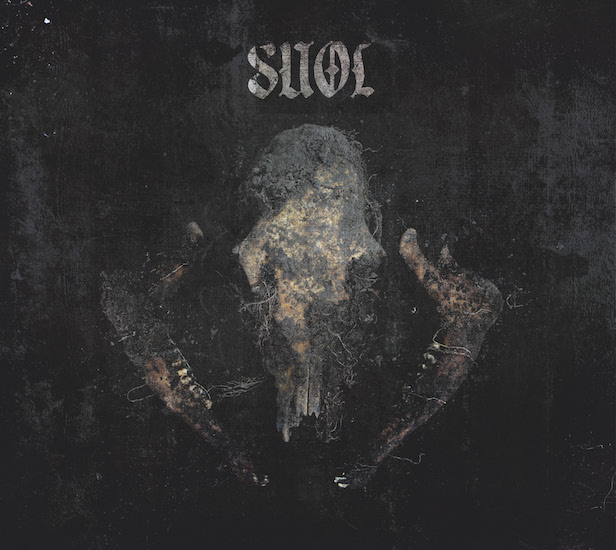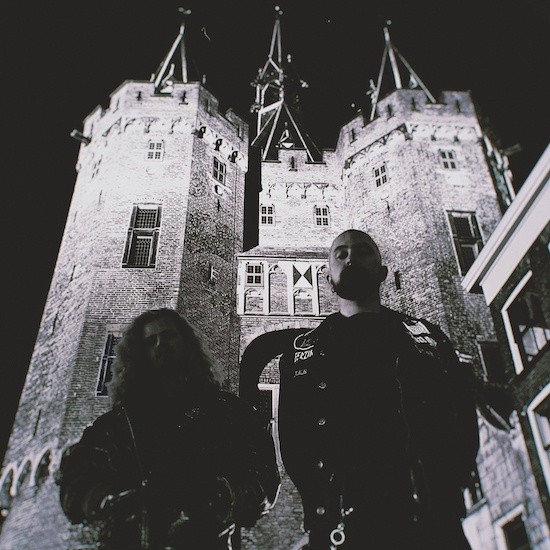
The two Dutch musicians J. and P. have had no shortage of personal projects and bands through which to express their creative impulses, usually channeled in variants of black metal. Between them they have made music under the names Shagor, Ossaert, Dinbethes and Weerzin. But they’ve also joined forces in a new entity named Suol.
What inspired this new union? The answer is that J. and P. have a shared passion for local myths, sagas, and historical stories surrounding the Dutch town of Zwolle and the nearby river IJssel, which ultimately discharged into a shallow bay in the North Sea once known as the Zuiderzee.
Suol became their vehicle for exploring these old tales and historical events through black metal, and the results are captured in a self-titled debut album (which included participation of other musicians from their local region) that will be released on October 27th via Swarte Yssel.
What we have for you today is the premiere of a lyric video for a song from the album named “Over de Geute“. Given the nature of Suol‘s inspiration, it’s no surprise that the lyrics are in Dutch, not English, but we do have Suol‘s English explanation for what the song is about:
“Every landmass covered with rivers has myths and legends surrounding fishermen encountering devils and spirits while on their ships. The IJssel region is no exception. ‘Over de Geute’ tells the story of a captain and his shiphand on their botter at the river mouth of the IJssel, De Geute.
“Having laboured tremendously hard and ending up with not much to show for that labor, the captain and his shiphand call it a day and turn to bed for the night. The shiphand wakes however, hearing beautiful yet sorrowful singing. The captain and his shiphand move above deck only to be confronted with dark shadows pulling their botter in towards them.. ‘De lamp die brandt, maar wij gaan liever over zand’.”
Google Translate renders those quoted words as, “The lamp is burning, but we prefer to walk over sand”. It may also help to know that “botters” were fast, flat-bottomed sailing ships used for fishing in the shallow waters of the Zuiderzee.
With further investigation we came upon a location (here) where the folktale is rendered in full, including the shipmates’ desperate escape from the shadow-figures that menaced them. It’s also written in Dutch, but when translated it includes other unnerving incidents of fishermen in the Geute being frightened away by supernatural manifestations.

Even without this background, or any comprehension of the words, the song “Over de Geute” is a frightening experience from beginning to end.
In some respects the music bows toward familiar conventions of black metal — intensely shrieked vocals, a dense whir of guitars, occasional outbursts of percussive turbulence, and the creation of a sinister atmosphere. But the song is also supremely effective in creating moods of tension, fear, and the intrusion of paranormal forces, and by the end it becomes so haunting that it puts a shivering chill on the skin.
The song is notable in other respects as well. For the most part the drumming eschews blast-beats, yet its variations are still a key ingredient in the song’s allure, and together with the prominent rumble and throb of the bass it gives the song’s rhythms a primal power.
Moreover, the riffing saturates the senses like a swirling fever dream, straddling a line between ringing clarity and scarring abrasion, between unearthly wonder, malignant menace, and dismal hopelessness, and the lead guitar at times sounds like a wailing apparition.
As mentioned earlier, in the song’s second half it becomes even more haunting, thanks to a soaring soprano voice that’s truly spine-tingling, and a flowing wash of guitars that creates moods of sorrow and despair.
The themes of the six songs on the album include tales of “past arsonist robber barons, shore devils, black shadows, devoured villages and strung-up murderers.” The song you’ve just heard is the second single from the album. The first one, “Slot van Voorst“, had its premiere at Black Metal Daily (here), and we’re including that stream too. Regarding the inspiration behind this song, the band have commented:
“When diving into Zwolle’s history, P. and J. encountered a story about a very prolific family in the 13th century: Baronial family Van Voorst. The Barons Van Voorst were very ambitious, were feared by city folk and traders alike, and managed to build up their own independent area of power around Zwolle with all kinds of tactics to increase their wealth.
“Operating out of Slot van Voorst and earning their reputation of robber barons, this inevitably led to the clash between Baron Zweeder van Voorst and the city of Zwolle. This led to the city council calling in the help of the bishop of Utrecht, Jan van Arkel.
“However, Baron Zweeder van Voorst was not pleased with this and, hot headed as Zweeder van Voorst was, things escalated quickly with the arson of Zwolle as a result. ‘Ruiten ende roven is gheen schande, dat doen die heren al die besten van den lande.’”
This song also thoroughly saturates the senses, again frightening and also tragic. Perhaps even more sweeping and panoramic in its sound, it creates an atmosphere that’s dismal and forlorn to the point of wretchedness, but elevates to even greater planes of stricken intensity through operatic choral vocals and vividly hurtling drums, in addition to the shattering intensity of the throat-ruining screams and the piercing riffage.
We mentioned that J. and P. worked with other musicians exclusively from their locale in bringing the music to life. These included drums by Elshschappij Tovenaere, vocals by H. and S, and spoken words by D.
As with Shagor, Dinbethes and Weerzin, Suol collaborated with Artfromtheunderground for the album’s artwork. The lyric booklet also includes pencil drawings supplied by J.B. Both the Digipak CD release and the digital release will be handled by Swarte Yssel.
SUOL:
https://suolblackmetal.bandcamp.com/
SWARTE YSSEL:
https://swarteyssel.com/
https://www.instagram.com/swarteyssel/
https://www.facebook.com/SwarteYssel/

